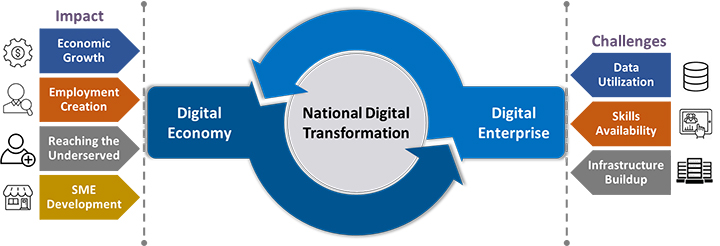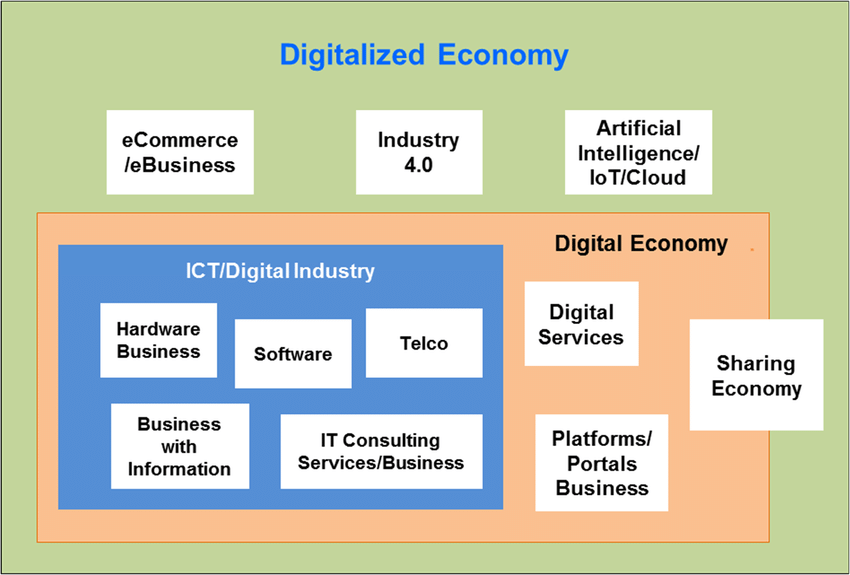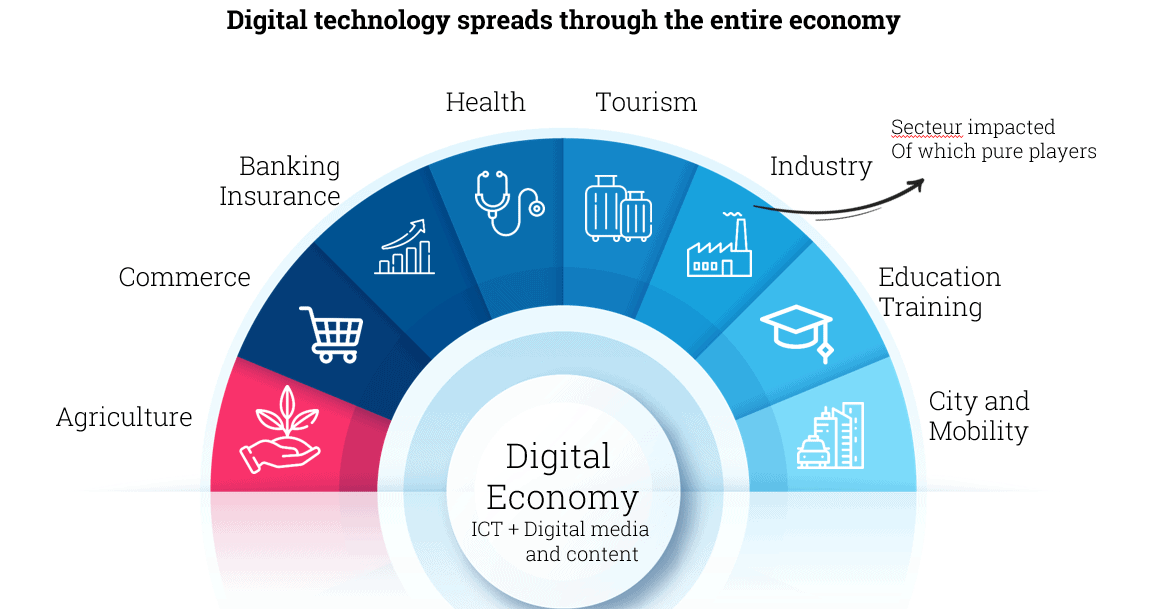Impact of Digital Economic Platforms: Revolutionizing Modern Business
Imagine a marketplace without walls, where businesses rise and trade with the click of a button. The impact of digital economic platforms has reshaped how we understand commerce, forging a path where growth and disruption walk hand in hand. As an expert entrenched in the digital marketplace, I’ve witnessed firsthand how these platforms are not just changing the game—they’re redefining the very rules. From the seismic shifts in traditional business models to the enablement of economic expansion, this modern revolution affects us all. Embrace the digitized economy’s might and dive into what’s driving today’s business evolution right here.
Disruption and Growth: The Dual Forces of Digital Marketplaces
Digital Marketplaces Impact on Traditional Business Models
Digital marketplaces have shaken up the old ways we buy and sell. Not long ago, buying a shirt meant going to a store. Now, you click a button at home. This ease changes how stores work and compete. Big retail chains once ruled. Today, small online shops can stand tall next to them. This shift comes from what we call “digital business models.” Think about how Uber changed taxis. A person with a car can now make money giving rides. This is how technology-driven markets transform the game.
But let’s break this down. How exactly do these marketplaces mess with old business methods? Well, it’s all about how they link buyers and sellers. They cut out the middleman. This means stuff can get cheaper. Mom-and-pop shops can reach people far away. Customers have more choices than ever. Also, the gig economy came out of this change. People like the freedom to work when they want.
Economic Growth Facilitated by Online Platforms
Online platforms have given a big push to economic growth. They make it easier to sell and share. This brings more people into the world of work. Think about people who handcraft things. Sites like Etsy let them sell worldwide. This wasn’t possible before as easily. Then there’s Airbnb. It lets you rent out a spare room. This means even your home can help you earn.
These platforms also give rise to peer-to-peer networks. They bolster trust between strangers. Both sides rate each other. This builds a system of trust and helps the business grow. And don’t forget blockchain. It keeps transactions secure and clear, and it’s not just for Bitcoin. It’s making sure when you buy something online, it’s safe and sound.
Online platforms have created jobs, lots of them. Not just for tech folks. For everyone willing to jump in. More folks working means more money moving around. And when money moves, the economy grows. That’s what’s happening with the boom of online financial services. They help people manage their money with a few clicks.
Digital marketplaces offer more than jobs and growth. They bring challenges, too. We need good rules to keep everyone playing fair. We talk a lot about data privacy in digital platforms these days. It’s important. We want our online secrets to stay secret. And we need to think about platform workers rights. They should get a fair shake for their work, even if it’s on an app.
These marketplaces are not just about making money. They help bring people together. Collaborative consumption is a fancy term for sharing stuff, so we use less. It’s good for our pockets and the planet. Last but not least, they’ve sparked a ton of new ideas. Digital platforms are hotbeds for innovation. They keep changing to offer better ways to buy, sell, and share.
In the end, whether we’re selling homemade candles or offering a ride, digital marketplaces let us do it on a grand scale. They tear down old walls and build new bridges. They change not just how we do business, but how we live. Isn’t that something spectacular?
The Gig Economy and Blockchain: Redefining Work and Value
How the Gig Economy Is Shaping Labor Dynamics
The gig economy is changing how we work. It’s like a digital marketplace for jobs. People find short, flexible jobs here. These are gigs, not 9-to-5 roles. Workers choose when and where they work. It’s a big shift from before.
Gig jobs help people earn on their own terms. They’re a side hustle for some, a full-time job for others. Digital platforms connect workers to these gigs. Think of Uber or Airbnb. These are just examples. Most of us have used them or know someone who has.
But this isn’t just about uber drivers or room rentals. All kinds of jobs are going gig. We’re talking writing, graphic design, and more. They’re at your fingertips with a click.
Here’s where gig economy effects stand out. More people now mix jobs. They’re becoming their own bosses. They enjoy this freedom. And, they can work with clients across the globe. No need to move to a big city for a great job!
We can’t talk gigs without mentioning digital business models. They make this flexibility possible. These models mean you connect, work, and get paid online. So, the impact on traditional work is massive.
Yet, there are things to remember. Gig workers need rights, like any job. They should get fair pay and respect. Sometimes, this doesn’t happen. We need to fix this. It’s only right.
Next, let’s talk tech. The gig economy relies on it.
Blockchain’s Role in Securing Digital Economic Transactions
Blockchain isn’t just for bitcoin. It helps gig work stay safe. It’s tech that keeps records, like a super-secure list. No one can cheat or change old data.
For gig workers, blockchain means trust. They can feel sure they’ll get paid. And clients know their work will get done. It’s a win-win. It’s like a digital handshake that everyone can trust.
This tech is also behind digital currencies. Think of virtual coins you use online. They can pay for goods or gig jobs. It’s fast and works all over the world. No banks in the middle, no extra fees. It’s the future money for the internet, and it’s growing fast!
Peer-to-peer networks come into play here. They let us share things without a big company in the middle. This leads to benefits like lower costs and more control for users.
Yet, as we enjoy these advances, we can’t forget data privacy. In our connected world, keeping our info safe is key. After all, it’s our personal stuff on the line.
So, we’ve dipped our toes into this new work and value world. It’s exciting and full of chances. As we move forward, let’s make sure everyone benefits. That’s the goal – to make work work for us all, right?
Consumer Interaction and Regulatory Challenges in the Digital Age
Adapting to Consumer Behavior Shifts Towards Online Environments
We see it every day: more people shopping and doing business online. This surge changes how digital marketplaces operate. We must learn the new rules of this game fast. People now want ease, speed, and safety when they buy or sell goods and services online. So, economic growth online platforms chase becomes a top goal.
Digital business models have to keep up with this shift. Think of how Uber changed rides or Airbnb changed stays. They show us how technology-driven markets transform our world. These platforms create huge opportunities for people to earn money, also known often as the gig economy effects.
For instance, if you have a car, you can drive for a ride-share app. The peer-to-peer networks benefits are huge. You can work your own hours and be your own boss. Also, things like blockchain in the digital economy make it safer and more trustworthy to do business.
But it’s not just about rides or stays. Lots of folks make money through virtual goods trade influence, like selling items in video games. And let’s not forget how online financial services growth. We can now bank from the warmth of our beds, can’t we?
Then we have digital currencies. These are like the dollars or euros you use, but online. They can make buying and selling faster and reach across the world. E-commerce impact on retail is also massive. Old-school stores must go online to keep up with internet shops.
Balancing Innovation with Platform Economy Regulation
Now, this world of online clicks and buys sounds perfect. But it needs rules to keep it fair and safe. That’s where platform economy regulation steps in. We need laws to protect both buyers and sellers.
Sharing economy environmental effects are important too. When we share rides or tools, we use less and help our planet. But we must protect our personal data too. Data privacy in digital platforms is a big must.
We need to take care of the folks who work on these platforms as well. Platform workers rights are just as key for drivers as for coders. When we talk about collaborative consumption, we mean sharing what we have. And by sharing, we help others while we help ourselves.
Innovation keeps these digital platforms growing. The brightest minds make sure we stay on the cutting edge. Think of the last time an app update made your life easier. Yes, consumer behavior shift online drives these changes. But it’s top brains behind screens making it all happen.
We also can’t ignore how algorithms help us decide what to buy or sell. They’re part of the digital transformation in business. And it’s huge that online marketplaces create jobs, isn’t it? From tech support to delivery folks, new jobs pop up every day.
And these create chain reactions, or network effects on the economy. One seller’s success can help a bunch of other people too. Digital services fire up global trade as well. A person in New York can sell to someone in Tokyo. Neat, right?
We keep a sharp eye on how these marketplaces play with competition law too. They must not get too big and push out the little guy. Lastly, we aim for sustainability in digital markets. It’s about making money while caring for tomorrow.
So, we keep chatting about social media commerce, freelancing on digital platforms, and all the other new things. We’ll learn and grow, all while we click, swipe, and tap our way into tomorrow’s business world.
The Future of Commerce: Integrating AI, Big Data, and Sustainability
Artificial Intelligence and Big Data in Personalized Economic Interactions
Imagine walking into a store where the shelves adjust to show just what you like. This is what AI and Big Data do online. They learn what you want. Then, they show you things that match your taste. It’s like having a friend who knows you well. This friend guides you through a huge mall, fast.
Online, AI sorts through tons of data about what you click, like, and buy. It gets smart about what you love. With this, digital businesses create a special shopping spot for you. It keeps you coming back for more. Why? It’s simple. You find what you want without much work.
AI in economic platforms helps shops know what to sell. It can even guess what you might want next. With big data analytics, companies see trends. They get a clear picture of what sells and who’s buying. They then stock up just right, so nothing goes to waste.
This smart tech makes shopping easy and fun. Plus, it helps shops make better choices about what they sell. It’s a win-win. You save time and get what you want. Shops sell more and stock better. But it’s not all about money. Let’s look at how this tech also cares for our planet.
Promoting Sustainable Practices Within Digital Marketplaces
Green choices matter to many of us. We care about our Earth. That’s why digital marketplaces are now cleaner and kinder to nature. They cut down waste by matching what we buy with what’s made. This means fewer things get tossed out.
For example, some online shops let you order clothes to try at home. You keep what fits and send back what doesn’t. Then, they learn what sizes and styles you like. Next time, you’re more likely to get a perfect fit. This means less back and forth. It saves fuel and cuts down on boxes and bags.
Digital platforms are smart. They share things like cars and tools. Why own something if you only use it once in a while? Sharing cuts down on clutter and waste. It saves resources and space. It’s like having a big community closet. Take what you need, then put it back for the next person.
Online marketplaces also team up with delivery services. Together, they make sure your things move smartly around the city. Fewer trips mean less pollution. It’s like carpooling for packages. They all get to where they need to go without extra rides.
As we shop online, we also help small crafters and farmers. Many find it hard to sell in big stores. But online, they reach people everywhere. When you buy from them, you support families and small businesses. It’s a choice that feels good and does good.
Now, don’t forget about protecting your personal info. Digital platforms must keep our data safe. It’s a big part of making sure we can trust online shopping. Even with all these cool things tech brings, we all need to feel safe as we click and buy.
Tech makes shopping smarter. AI and Big Data make it fit for you. Sustainable practices help our planet. And in all this, trust and safety stand strong. That’s the future of buying and selling. It’s smart, kind, and ready to grow more with each click.
In this post, we dove into how digital marketplaces shake up classic business ways. We saw that online platforms lead to more money-making chances. Then, we explored the gig economy and blockchain, seeing how they change work and keep digital deals safe. We talked about how shops and services must keep up as more people buy online and why smart rules matter. Lastly, we looked at how AI and big data make buying stuff more personal and how online shops can be more green.
I believe embracing these changes is key. It means more choice, better prices, and new jobs. It’s also about keeping things fair and safe. If we balance the new with what we must protect, I feel sure the future will be bright and filled with opportunity. Let’s move forward with smart tech and green ideas to make shopping in the future great for everyone.
Q&A :
What are digital economic platforms and how do they influence the economy?
Digital economic platforms, also known as digital marketplaces, refer to online systems that facilitate commercial interactions between buyers and sellers, often leveraging technology to improve efficiency and accessibility. They can significantly influence the economy by reducing barriers to entry for small businesses, fostering innovation, creating new job opportunities, and promoting competition. Enhanced data collection capabilities also allow for better market analysis and decision making.
How do digital economic platforms contribute to GDP growth?
Digital economic platforms contribute to GDP growth by streamlining trade processes, increasing productivity, and enabling new market entrants. These platforms often lower operational costs and provide new avenues for revenue generation, both for the platforms themselves and for the businesses that utilize them. Their role in expanding consumer choice and accelerating the speed of transactions also stimulates economic activity and contributes to national economic growth.
What are the challenges faced by digital economic platforms?
Challenges faced by digital economic platforms include ensuring user privacy and data security, managing regulatory compliance across different jurisdictions, and maintaining fair competition. These platforms must also tackle issues like digital fraud and cyber-attacks. Balancing the need for innovation with consumer protection is an ongoing concern, as is addressing the digital divide that can prevent some demographics from fully participating in the digital economy.
How do digital economic platforms empower small and medium-sized enterprises (SMEs)?
Digital economic platforms empower SMEs by providing them access to larger markets without the need for significant upfront investment in physical infrastructure. These platforms can level the playing field, allowing SMEs to compete with larger companies by offering seamless access to supply chains, global customers, and a variety of online payment methods. Additionally, they often provide SMEs with analytical tools to better understand market trends and consumer behaviors.
In what ways do digital economic platforms impact employment?
Digital economic platforms can impact employment by creating new job categories and enabling a gig economy where individuals can offer services on a freelance basis. They can lead to the creation of jobs that didn’t previously exist, such as app developers, digital marketers, and platform-specific roles. While they offer flexibility and entrepreneurship opportunities, there are concerns about job security and benefits that are typically associated with traditional employment.



